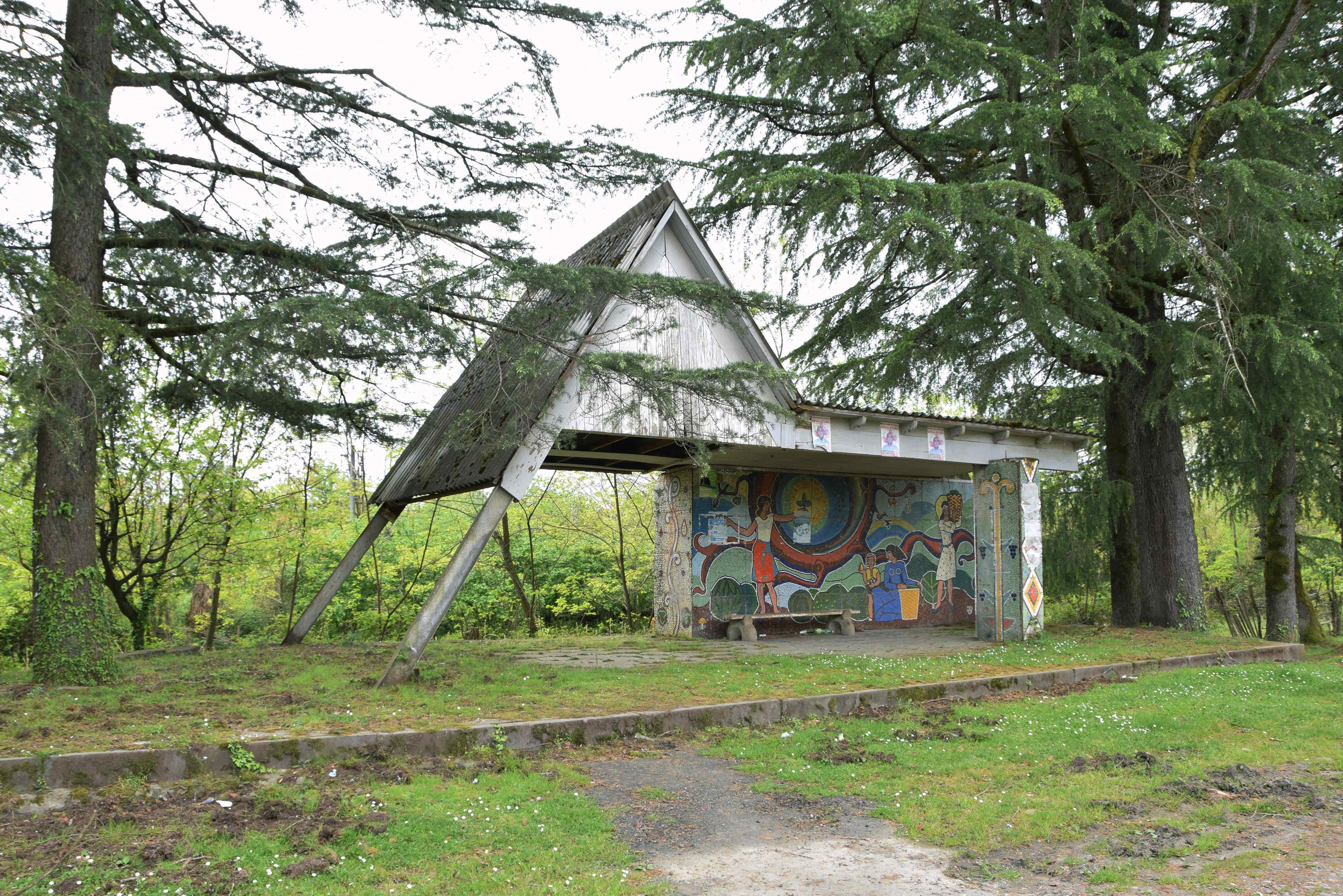An eerie tour of Georgia’s forgotten Soviet bus stops
- Text by Eva Clifford
- Photography by Nanuka Zaalishvili

Ever since she was a child, Nanuka Zaalishvili remembers seeing the strange shapes of Soviet bus stops along the roadsides of her native country, Georgia.
After growing up and qualifying as an architect, Zaalishvili came into photography unexpectedly when curiosity led her to return and document these forgotten constructions.
“For me, being an architect does not only mean sitting in a studio designing buildings or interiors,” she says. “It’s more about exploring the world around me and things that surround us in daily life.”

Natakhtari
Zaalishvili makes clear from the outset that she is not a photographer. “I had no idea how to use a camera, so the first pictures I took are not professional photos,” she says. Yet, a couple of years into the project she decided to make the pictures public, and they soon sparked an interest.
To find the bus stops, Zaalishvili scoured the country by car. Setting out from the Georgian capital Tbilisi, she drove with a different route in mind each time. While some were easy to find, others were set back a long distance from the main road – and, in some cases, new bus stops had been built in front of the original Soviet ones.
“Some of them are still functioning, but the majority are not,” explains Zaalishvili. “Nowadays, public transport will stop wherever you wave your hand, so nobody uses the bus stops.”

Kakhuri
In Soviet times it was a different story, because independent travel was discouraged and people relied heavily on public transport to get them from A to B.
As the pictures illustrate, no one bus stop is the same. Some are decorated with vibrant mosaics specific to that region – for example, grapes will signify a famous wine region – while others look like they’ve just landed from outer-space. Zaalishvili hopes that in documenting their diversity, others will also appreciate their value and see them as an important heritage of Soviet-era Georgian architecture.

Chalaubani

Goderdzi Pass

Rustavi

Manglisi

Borjomi

Patara Chailuri

Patara Kanda

Kobuleti
Zaalishvili’s book Soviet Bus Stops in Georgia is available now. Zaalishvili runs an architectural studio, as well as a site dedicated to all things architecture-related.
Zaalishvili was one of the exhibiting photographers at Kolga Tbilisi Photo Week, which takes place each May in the Georgian capital.
Enjoyed this article? Like Huck on Facebook or follow us on Twitter.
Latest on Huck

Plestia Alaqad: “Journalists should focus on humanising people”
Huck’s April interview — Having become one of the most crucial and followed voices from inside Gaza in the aftermath of October 7, the award-winning author and journalist is releasing a new memoir, ‘The Eyes of Gaza’, collating diary entries made over the past 18 months. We caught up with her to hear more about it.
Written by: Isaac Muk

The instrument makers taking DIY music to a whole new level
What does it take to construct a modular synth? How do you turn a block of wood into a double bass? Here, four craftspeople explain why they chose to rip up the rulebooks and build their own music-making machines.
Written by: Daniel Dylan Wray

Southbank Centre reveals new series dedicated to East and Southeast Asian arts
ESEA Encounters — Taking place between 17-20 July, there will be a live concert from YMO’s Haruomi Hosono, as well as discussions around Asian literature, stage productions, and a pop-up Japanese Yokimono summer market.
Written by: Zahra Onsori

In 1971, Pink Narcissus redefined queer eroticism
Camp classic — A new restoration of James Bidgood’s cult film is showing in US theatres this spring. We revisit its boundary pushing aesthetics, as well as its enduring legacy.
Written by: Miss Rosen

As amapiano goes global, where does it leave its roots?
Rainbow grooves — Over the past decade, the house music subgenre has exploded into a worldwide phenomenon. Jak Hutchcraft went to its birthplace of Mamelodi, South Africa, to explore its still-thriving local scene.
Written by: Jak Hutchcraft

Clubbing is good for your health, according to neuroscientists
We Become One — A new documentary explores the positive effects that dance music and shared musical experiences can have on the human brain.
Written by: Zahra Onsori